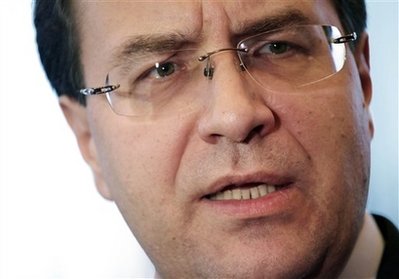
Russia Tries to Build Political Influence in Moldova From Scratch
Publication: Eurasia Daily Monitor Volume: 6 Issue: 220
By:

Moldova’s parliament, a product of repeat elections in July and deadlocked since then, has scheduled its fourth official attempt this year (technically the fifth attempt) to elect a head of state for December 7.
The governing Alliance for European Integration (AEI) officially supports Marian Lupu, leader of the Democratic Party (third-largest in the four-party Alliance) as its collective candidate for head of state. The nominally communist opposition has refused to designate a candidate thus far. The communists, in power from 2001 to 2009, hold more than enough seats to block the election of the head of state in parliament and force new parliamentary elections.
While the tug-of-war between the communists and the AEI captures public attention, a parallel contest is ongoing within the AEI itself. Behind the Alliance’s façade of unity, certain leaders have not conclusively given up their own presidential ambitions, which they seemed to have renounced when nominating Lupu as joint candidate. The current Prime Minister Vlad Filat, and the leader of Moldova Noastra (AEI’s smallest party), Serafim Urecheanu, had announced presidential ambitions prior to AEI’s nomination of Lupu. With the presidential election turning into a long-drawn-out process, and Lupu’s chances consequently looking more uncertain, internal rivalries seem recrudescent in AEI.
Lupu unveiled this situation for the first time in his latest news conference on November 24. Alluding to “differing positions and voices [within the AEI] regarding the presidential election”, he could not predict “whether these would unify or would divide even further.” Lupu warned against the intractable situation that would result “if the principles, adopted at the Alliance’s foundation, are not respected.” If the presidential election fails again and new parliamentary elections are held, Lupu said, the Democratic Party might run separately from the other AEI parties (Moldpres, November 24).
Concurrently, Lupu has proposed a 12-point platform for cooperation with the opposition Communist Party. Initiated by him and endorsed by the AEI, the platform is subject to further negotiation with the Communist Party, as a possible basis for Lupu’s election as president with that party’s support (Basapress, News-In, November 25).
Lupu is a Western-oriented politician, favorably regarded in Brussels and other European capitals, and with no links to Russia. Unlike the AEI leaders, Lupu has no personal links to Romania. He and some other AEI politicians of Lupu’s generation (now in their early forties) represent a cultural leap from the post-Soviet era into the European integration era for Moldova.
For its part, Russia would prefer a Moldovan leadership that modifies the existing, unambiguous European orientation by introducing a two-vector policy between Europe and Russia. By the same token, Russia would welcome a Moldovan leadership that sets limits to Romanian influence in Moldova.
Moscow’s optimal solution would be to support a respected Moldovan politician with a European face, who would preside over a two-vector policy. Furthermore, such a Moldovan president would have to operate in alliance with one or several political groups amenable to Russian influence. Moscow apparently hopes that it could embed Lupu into such an arrangement. The Kremlin’s attempts to persuade the Moldovan Communist Party or at least a part of it to break the deadlock and support Lupu’s election as president (EDM, November 4), however, have not borne fruit thus far.
There are no pro-Russia elements in the AEI; and few such in the opposition Communist Party’s leadership (which had distanced itself dramatically from Moscow in recent years). All Moldovan political leaders including communists subscribe to the goal of European integration (despite differences of degree in their understanding of that goal). The Communist Party, however, has switched from a pro-Europe stance to an equidistant stance between Europe and Russia in its electoral rhetoric this year.
While some AEI politicians feel close to Romania, and some are prone to Romanian national irredentism, no significant Moldovan politician is oriented toward Russia. Even among communist parliamentarians, political Russophiles (as distinct from cultural ones) are a few passive backbenchers. Russian direct political influence in Chisinau was absent during the nominally Communist Vladimir Voronin’s presidency (2001-2009). Pro-Moscow groups operate outside the Communist Party, on the left fringe of “Russian-speaking” ethnic groups. However, Chisinau’s intense partisan, factional, and personal rivalries –coupled with the urgency of external economic support to the new government– impel some leaders and groups to reach out not only to the European Union or Romania, but also to Russia. In this situation, presidential aspirants and government leaders responsible for the economy are engaging in tactical fence-mending with Moscow.
Consequently, Moscow sees an opportunity to build political influence in Chisinau for the first time since 1991. It has started this effort almost from scratch in recent months. The Kremlin and the Russian government are approaching Moldovan political groups and key contestants for power, seeking to shape the outcome and create a basis for working with a post-crisis government.




